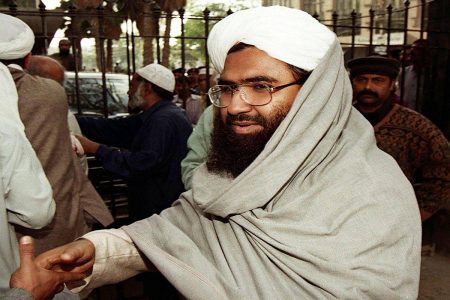
Jaish-e-Mohammad founder Masood Azhar is India’s most-wanted terrorist
Jaish-e-Mohammad founder and man behind several terror attacks in India Maulana Masood Azhar has become India’s most-wanted terrorist and eliminating Azhar is a key objective for Indian establishment, according to a recently published article in the New York Times (NYT).
In a recent article titled ‘The Terrorist Who Got Away’ in NYT journalist Yudhijit Bhattacharjee refers to the rise of Azhar, backed by Pakistan Army, and his designs to launch of cross-border strikes.
“Pakistan’s current prime minister, Imran Khan, has publicly stated that Pakistan’s Army organized and trained militant groups years ago to wage jihad against Soviet forces in Afghanistan. Some of these groups continue to operate in Pakistan, four decades after the end of the Soviet-Afghan war. The country’s former president, Gen. Pervez Musharraf, has acknowledged that Pakistani intelligence enabled Jaish and similar groups to carry out attacks within India.
Such admissions confirm what Indian officials say they’ve always known: that organizations like Jaish have become part of a Pakistani strategy for wresting Kashmir from Indian control,” points out Bhattacharjee in his article which has been described as the most comprehensive one in one of top US newspapers on Pak-based terrorist banned by UN.
“For that and other reasons, Azhar has become India’s most-wanted terrorist. Just as the pursuit of Osama bin Laden drew the United States into a long and continuing military engagement in Afghanistan, Azhar’s success in orchestrating a series of attacks on Indian soil in recent years has angered India to the point that eliminating Azhar and his organization has become a key strategic objective for India’s security establishment.
Twelve days after Jaish’s attack in February 2019, Indian fighter jets flew 50 miles or so across the Line of Control, the disputed border, into the Khyber-Pakhtunkhwa province of Pakistan, in order to bomb a hilltop near Balakot that Indian officials said was the site of a Jaish terrorist-training camp. It was the first time since the war between the two nations in 1971 that India has conducted airstrikes inside Pakistani airspace…”
“Despite the deadly attack in Pulwama, and the other attacks for which Jaish claims responsibility, Pakistan has refused to prosecute Azhar or bring the organization to justice. Indian officials find this galling but unsurprising, because, they contend, Inter-Services Intelligence – Pakistan’s powerful intelligence service – provides Jaish with funding, training and logistical support to fight a proxy war against India,” the writer claims.
Talking to ET over phone from USA Bhattacharjee said, “Indian investigators did a fabulous job years ago in interviewing Masood Azhar when he was in Indian prison. Some of those details have been reported previously in the Indian press, although I was able to get them first hand from Indian officials and court documents.
Indian investigators – particularly from the National Investigation Agency – have assembled sold, credible and detailed evidence of the Jaish’s involvement in various attacks, most notably the attack on the Pathankot air base. I was fortunate to be able to learn some of these details over the course of multiple interviews with different sources.”
“The impunity with which Azhar has operated for so long is a source of anger among Indian security officials. It keeps raw an old wound; it reminds them that two decades ago, they had the cleric in their grasp, languishing in one of their prisons.
But after the hijacking of an Indian Airlines flight by Azhar’s associates, which Indian investigators say bore the marks of a Pakistani intelligence operation, they were forced to let him go in exchange for the passengers’ freedom. He founded Jaish shortly afterward,” points out Bhattacharjee.
Though it hasn’t carried out any notable attacks in Kashmir in the past six months, the group continues to be a threat, wrote Bhattacharjee quoting Indian officials. The writer recalls that years back on trips to Saudi Arabia, the United Arab Emirates, Zambia and Britain, Azhar delivered passionate speeches exhorting audiences at mosques and seminaries to do their part for jihad, which brought funds pouring into the group’s coffers.
Source: Economic Times





